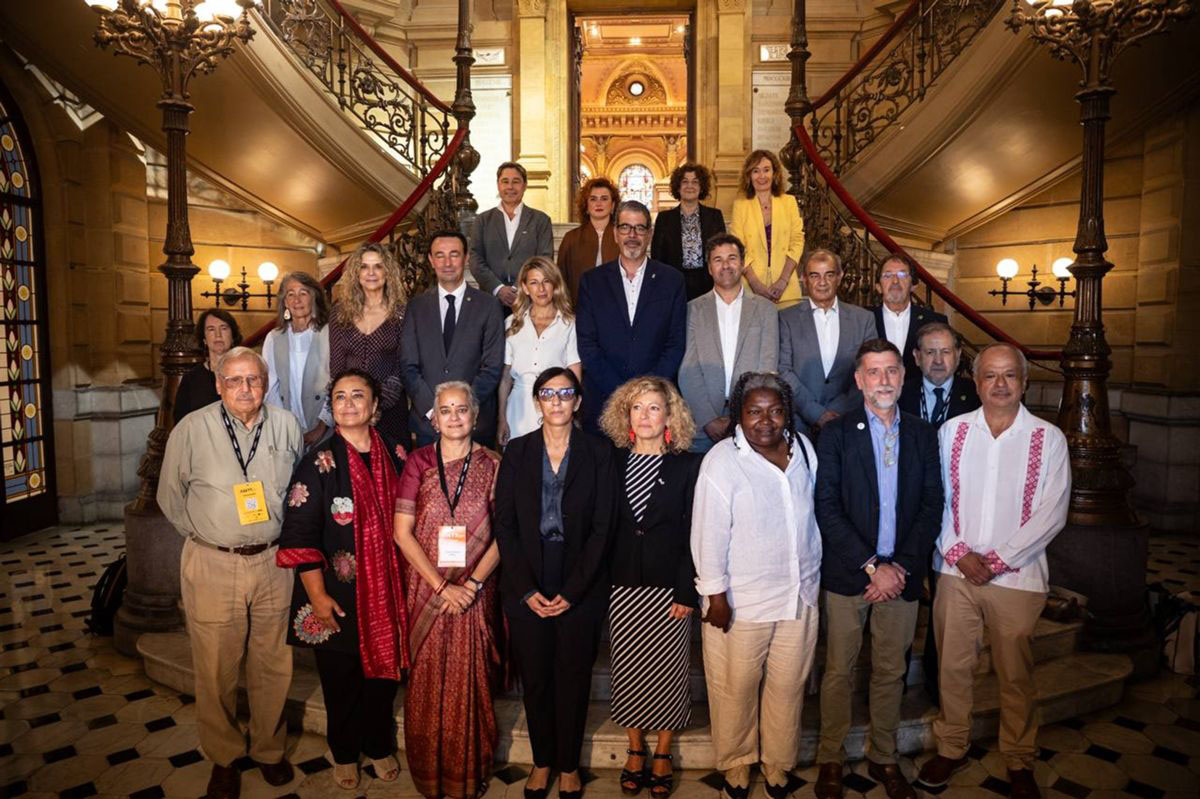 The Second Vice-President and Minister for Work and Social Economy, Yolanda Díaz, along with representatives of the international advisory board of the cutting-edge hub ASETT
The Second Vice-President and Minister for Work and Social Economy, Yolanda Díaz, along with representatives of the international advisory board of the cutting-edge hub ASETT
The Second Vice-President and Minister for Work and Social Economy, Yolanda Díaz, has encouraged the international advisory board of the cutting-edge hub Arizmendiarrieta Social Economy Think Tank (ASETT) to promote the transformative action offered by the Social Economy during the first ASETT international forum held in Donostia.
"It is the alternative. This model offers much-needed certainties: decent work, economic democracy, and a commitment to the territory and the planet," the vice-president assured the members of the council, which includes leading experts in the field of social economy from Asia, Africa, Europe, and America, such as Simel Esim, Director of the Cooperatives and Social and Solidarity Economy Unit (COOP/SSE) of the International Labour Organization (ILO); Brazilian economics professor Ladislau Dowbor; the head of the Social Economy and Innovation Unit of the Organisation for Economic Co-operation and Development (OECD); Pauline Effa, national coordinator of the NGO Partenariat France & Afrique pour le Codéveloppement (PFAC) and co-founder of the African Forum for Social and Solidarity Economy (FORAESS); Italian MEP Irene Tinagli; Franc Cortada, director general of Intermon Oxfam; and Jonathan Wong, head of innovation, enterprise and investment at the United Nations, among others.
ASETT is a platform comprising a research centre to identify business models with social value, a foresight institute that brings together companies, institutions and academics, as well as a laboratory of Social Economy projects to disseminate the good practices of the business formulas that comprise it: mainly cooperatives, labour companies, special social initiative employment centres or fishers' guilds, among others.
At the first international forum of this think tank, held this Thursday and Friday in Donostia, bringing together hundreds of experts from four continents, its vocation to become a global benchmark for the Social Economy, which in Spain alone accounts for 10% of GDP, became clear. "ASETT must be the great driving force for the visibility and global projection of the Social Economy, positioning it as a real alternative in all spheres of daily life, from housing or energy to culture or finance," insisted the vice-president, who spoke with ministers and secretaries of state from different countries about public policies to promote this economic model.
Díaz also stated that it is at times of uncertainty such as the current international situation that it is most necessary to strengthen cooperation between countries and the commitment of public authorities and global institutions to promote models such as the Social Economy, which advocates a fairer distribution of the wealth from work, encourages social justice and the fight against inequality in the workplace.
"Its importance is demonstrated by facts: it generates decent employment, boosts territorial cohesion and fosters social innovation in the service of the common good and sharing of benefits," the vice-president stressed during her speech.
The vice-president also recalled the call to action to promote this productive model that has been signed by dozens of politicians, intellectuals, academics and leading figures in the Social Economy from all over the world, confident that this way of understanding economic activity is not a niche alternative, but an indispensable lever for progress in sustainability and equality. "The Social Economy is the vaccine against inequality," says the document, which has the support, among others, of the economist Thomas Piketty, Professor Isabelle Ferreras and the Palestinian Minister Enas Dahadha Attari, who spoke at the Forum via video.
Non official translation




